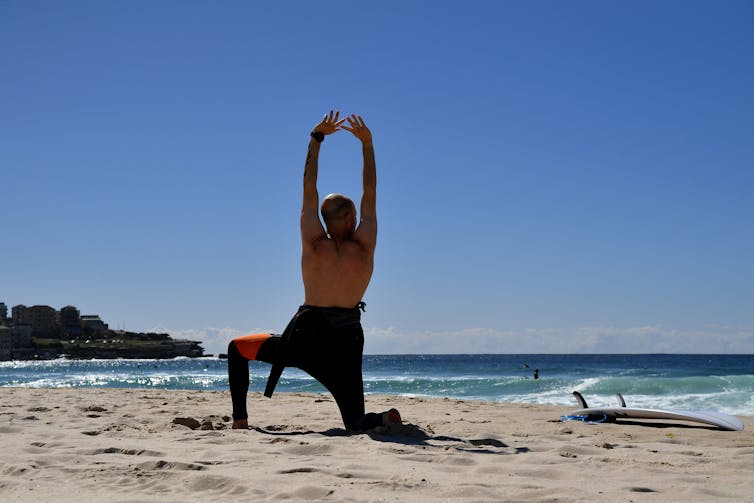Do you answer emails outside work hours? Do you send them? New research shows how dangerous this can be
- Written by Amy Zadow, Research Fellow in Organisational Psychology, University of South Australia
What could be so bad about answering a few emails in the evening? Perhaps something urgent pops up, we are tidying up an issue from the day, or trying to get ahead for tomorrow. Always being online and available is one of the ways we demonstrate our work ethic and professionalism.
But the creep of digital communications into our entire lives is not as harmless as we think.
Our new research shows how prevalent out-of-hours communication is in the Australian university sector. And how damaging it is to our mental and physical health.
Our research
Colleagues and I are studying how digital communication impacts work stress, work-life balance, health and sleep in the university sector.
We surveyed[1] more than 2,200 academic and professional employees across 40 universities from June to November 2020. We specifically looked at universities given the advancing technological[2] changes in the sector and importance of universities to our economic, social and cultural prosperity[3].
Our results
We found high levels of stress along, with a significant amount of out-of-hours communication. This includes:
- 21% of respondents had supervisors who expected them to respond to work-related texts, calls and emails after work
- 55% sent digital communication about work in the evenings to colleagues
- 30% sent work-related digital communication to colleagues on the weekends, while expecting a same-day response.
Employees who had supervisors expecting them to respond to work messages after work, compared to groups who did not, reported higher levels of psychological distress (70.4% compared to 45.2%) and emotional exhaustion (63.5% compared to 35.2%). They also reported physical health symptoms, such as headaches and back pain (22.1% compared to 11.5%).
It’s not just horrible bosses
We also found the same pattern when it came to contact between colleagues.
Groups of employees who felt that they had to respond to work messages from colleagues outside of work hours, compared to groups who did not, also reported higher levels of psychological distress (75.9% compared to 39.3%). They also reported higher levels of emotional exhaustion (65.9% compared to 35.7%) and physical health symptoms (22.1% compared to 12.5%).
Read more: As boundaries between work and home vanish, employees need a 'right to disconnect'[4]
Although the project team surveyed university employees, this is likely to reflect a society-wide problem of digital communication out-of-work hours. An Australia Institute survey[5] last year showed Australians were working 5.3 hours of unpaid overtime on average per week, up from 4.6 hours the year before.
Notably, 31% of employees in our sample reported a moderate or severe psychological disorder, and 62% said they thought the “psychosocial safety climate[6]” – of their workplace — the degree to which it protected their psychological health — was “poor”.
By comparison, an estimated 20%[7] of Australian adults have experienced a common mental disorder in the previous 12 months. A 2014 beyondblue survey[8], suggested 52% of employees find their workplace mentally healthy.
What does this mean?
The personal and social implications of blurred boundaries between home and work are serious. When employees are answering calls or responding to emails at home, this affects their recovery from work - both mentally and physically.
 If you’re always checking emails, this means less space to recover from work.
Joel Carrett/AAP
If you’re always checking emails, this means less space to recover from work.
Joel Carrett/AAP
Being in a constant state of hyper-vigilance awaiting work notifications at home can affect metabolism and immunity, creating susceptibility to serious health problems such as infection, high blood pressure and depression. In fact, recent research by the World Health Organisation and International Labour Organisation suggest that long work hours may even increase the risk of heart disease[9] and stroke[10].
Another problem is that when we get work calls or emails out of hours, this also reduces the time for recovery activities such as social interaction, physical exercise and spending time in natural settings.
These are critical activities to maintain physical and particularly psychological health. The personal and social ramifications of work intrusion into home life also have the potential to hurt family relationships, and community supports, like volunteering.
Next steps
So what needs to happen now?
We can focus on the immediate problem and reduce the extent of digital connectivity out of work hours. Negotiating work conditions to address the problem like the Victoria Police has recently done[11] is a good start. Amending the National Employment Standards to enforce the “right to disconnect” will also protect vulnerable low paid, non-unionised workers who do not have the capacity to negotiate their own work conditions.
Read more: Long hours at the office could be killing you – the case for a shorter working week[12]
But while these industrial regulations prevent managers from getting in touch, it won’t change the behaviour of colleagues hassling each other. Or the inward pressure many of us feel to work out of hours.
Workplace expert professor Maureen Dollard argues the problem of digital connectivity outside of standard work hours reflects a broader issue around the workplace culture and psychological health[13]. When an organisation values productivity over psychological health, then employees will feel more pressure to manage unrealistic deadlines.
Ultimately, our problem with out-of-hours emails and messaging reflects broader societal issues relating to the pressures of productivity, job insecurity and diminishing work resources.
References
- ^ surveyed (www.unisa.edu.au)
- ^ technological (www.nytimes.com)
- ^ prosperity (www2.deloitte.com)
- ^ As boundaries between work and home vanish, employees need a 'right to disconnect' (theconversation.com)
- ^ survey (d3n8a8pro7vhmx.cloudfront.net)
- ^ psychosocial safety climate (www.stresscafe.com.au)
- ^ estimated 20% (www.aihw.gov.au)
- ^ beyondblue survey (www.headsup.org.au)
- ^ heart disease (www.sciencedirect.com)
- ^ stroke (www.sciencedirect.com)
- ^ has recently done (www.abc.net.au)
- ^ Long hours at the office could be killing you – the case for a shorter working week (theconversation.com)
- ^ psychological health (www.unisa.edu.au)

















